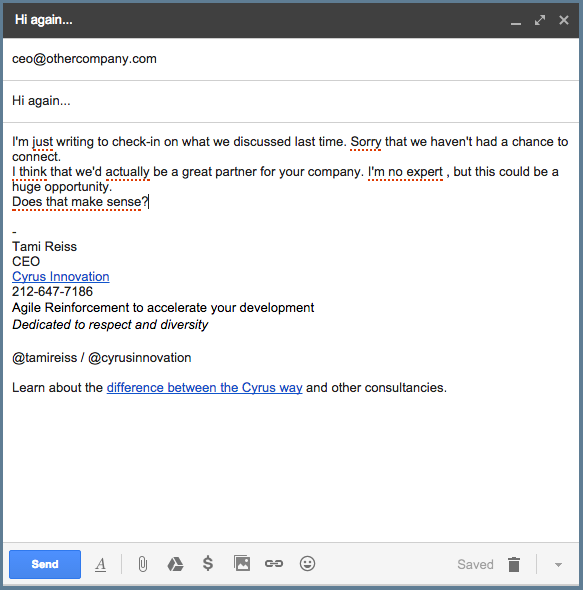Title: Just Not Sorry
Authors: Tami Reiss, Steve Brudz, Manish Kakwani, and Eric Tillberg of Def Method
Publication date: Dec 2015
Experience here/Website: https://chrome.google.com/webstore/detail/just-not-sorry-the-gmail/fmegmibednnlgojepmidhlhpjbppmlci?hl=en-US

I often do not write my emails alone. Daily, my colleagues and I draft emails together around a conference table. Often, we ask, “Can I read this to you all? How do I respond to this? What goes in this subject line?” And in the most difficult instances, we write the email together.
Moments like these seem to have only increased in my graduate studies. While this means emailing takes longer, it sometimes feels necessary to have the confidence to send them.
In a tweet that went viral, Gabby Noone commented on the particularly gendered nature of this experience:

Just Not Sorry is a Google Chrome extension that aims to address these gendered writing challenges in emails. Using a red squiggle line as for misspelled words, Just Not Sorry alerts authors to places in their emails where they hedge, qualify, or soften their ideas, directions, or expertise.
In this Webtext of the Month, we review this example of a digital writing space that has been modified for the needs of particular writers and with the goal of inclusion.
How It Works
Just Not Sorry was created in 2015 by Tami Reiss at Def Method (previously, Cyrus Innovation). At an event with other entrepreneurial women, Reiss was discussing clips from comedian Amy Schumer and reflecting on how often they all found themselves relying on gendered phrases and language, especially apologizing. She wondered why a group of business and team leaders weren’t writing with the confidence of people in those positions.
Out of these conversations, Reiss and her team created Just Not Sorry to alert writers to words or phrases that qualify or hedge. As of November 2017, these “warning phrases” include:
- Just
- Actually
- Sorry
- Apologize, Apologies, Forgive
- I think, We think
- I’m no expert, We’re no expert
- Yes, but
- Literally
- Very
- Kind of, sort of
- Does that make sense
- Try, trying
- I should
- I feel
- I believe
- I’m just saying
- In my opinion
- This might be a stupid question
- I may be wrong, I might be wrong
Reiss explains they chose to use the red squiggle because we are already “trained to see that as an error.” However, after realizing there’s nothing wrong with the spelling, Reiss hopes that writers “realize it’s because the word is hurting [their]message.”
The code is open source so anyone can modify it. Additionally, anyone can submit requests for new “warning phrases” to be included, as long as they provide “a link to an article that explains why the phrase could negatively affect someone’s message.”
Just Not Sorry Reflections
Brandee: I installed this soon after its release, and I was surprised to see how much of my emails came up red. I know I use “just” a lot, especially to preemptively apologize for my email (“I’m just writing to see…”), but those red squiggles showed up in phrases I hadn’t thought about. The one I edited out most quickly was “I think” because it made me realize I used it at the beginning of my ideas to soften them. Overall, I’ve found that it’s a useful tool, but I don’t always follow it as an absolute right or wrong. Sometimes, I want to say “just” or “sorry!”
Lauren: After installing the app, I did not find it underlining much in my emails, though I see myself using similar language to those listed as warning phrases, but just not those exact phrases. What I am left wondering with this app is how directness and leadership are connected to having confidence in one’s position. The core question seems to be how do women exhibit confidence, particularly in male-dominated fields and contexts? But here I am wanting to qualify all this by saying, “What do I know? I have never run a business; I’m just a graduate student.”
We hope this Webtext of the Month is an interesting companion to the DRC’s upcoming reviews from Feminisms and Rhetorics and blog carnival on openings for feminist action. In seeing this especially in conversation with the blog carnival, Material and Digital Rhetorics: Openings for Feminist Action, this Webtext raises possibilities for how feminist action can be taken through extensions, modifications, or hacks of digital spaces. However, we also wonder how cyberfeminist scholarship can help us understand the potential blurriness in this project between promoting inclusivity and disciplining women’s writing.
We are looking forward to ongoing discussions in the upcoming blog carnival on feminist digital challenges such as this!
